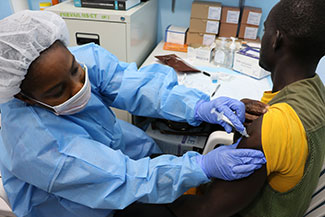Fogarty helps build research capacity to combat Ebola in West Africa
November / December 2019 | Volume 18, Number 6

Photo courtesy of NIAID
Since 2016, Fogarty has been supporting research training in
West Africa to build capacity to conduct clinical trials and
other studies.
Ebola remains a concern in sub-Saharan Africa, with the WHO continuing to report new cases in the Democratic Republic of Congo. Since the current outbreak began in August 2018, there have been about 3,200 confirmed infections and more than 2,200 deaths.
During the 2014-2016 Ebola pandemic that struck Guinea, Liberia and Sierra Leone, Fogarty developed
Emerging Epidemic Virus Research Training for West African Countries with Widespread Transmission of Ebola, a targeted program that has provided eight grants to encourage planning to build scientific capacity in the three countries, designed to help combat Ebola and other viral hemorrhagic fevers such as Lassa fever.
In the summer of 2019, Fogarty issued three new awards under its
Global Infectious Disease (GID) research training program that will provide further support to the three countries. The GID program's overarching goal is to increase the number of researchers and support staff who conduct independent infectious disease research in developing countries.
One grant,
Training in Clinical and Epidemiological Research for Liberia (TRACER), was awarded to the University of California, San Francisco (UCSF) - in collaboration with the University of Liberia - to strengthen capacity by enrolling early-career researchers in a two-year master's degree in clinical research at UCSF. Alumni will receive a partial stipend to use their skills to perform research in Liberia, with ongoing mentorship from UCSF and local faculty. The program will also support graduates to develop and teach introductory classes in research design, epidemiology and biostatistics.
“The long-term goal is to develop and support a trained cadre of researchers who can become independent, develop a similar research training program in Liberia and advance relevant infectious disease research in the region," according to UCSF Professor Dr. Krysia Lindan.
Another award,
Partnership for Research in Emerging Viral Infectious-Sierra Leone, is focused on combatting Lassa fever in Sierra Leone, where the disease poses a significant public health burden. The new grant will help develop the leadership needed to apply, manage and conduct research studies and clinical trials on Lassa fever and other diseases. It will support training in grants management, mentorship, grant writing and research skills. The project is a partnership among Tulane University, Vanderbilt University, the University of Sierra Leone and Kenema Government Hospital.
While there are no active Ebola cases in West Africa, “there is a significant risk of another spillover event from the animal reservoir - likely bats - to the local communities," said co-PI Dr. John S. Schieffelin, of Tulane. “This animal-to-human transmission is likely to lead to human-to-human transmission and could easily escalate to another outbreak."
The third award,
BU-UL in Liberia Partnership to Enhance Emerging Epidemic Virus Research, is supporting a partnership between Boston University and the University of Liberia to create a tiered research training program in emerging infectious diseases. It will provide master's and doctoral degree training, and foster mentored research projects in Liberia. A bootcamp will provide trainees with a background in the foundations of basic, translational and clinical research, and serve as the recruitment pool for advanced degree candidates.
In addition,
Research training program on control of malaria and neglected tropical diseases in Mali, a GID grant awarded in 2017 to Dr. Seydou Doumba of the University of Sciences, Techniques and Technologies of Bamako, Mali, is helping to strengthen scientific capacity across West Africa and is training researchers from underserved countries such as Guinea. Fogarty support is critical and has helped retain scientists, Doumba said. “You have very few organizations that are willing to spend money on training because you don't see the results right away. And there's a risk if you don't mentor people, you may lose them."
The NIH's National Institute of Allergy and Infectious Diseases (NIAID) is partnering with Fogarty to fund the awards, which are structured to facilitate collaboration with other U.S. government projects active in the region.
More Information
To view Adobe PDF files,
download current, free accessible plug-ins from Adobe's website.